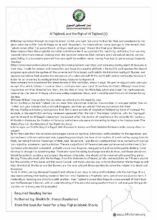A Risk of Early Marriage (Causes and Solutions)

Introduction:
One of the indicators of a society’s progress or decline is the prevalence of “early marriage”. Early marriage was a norm before the Industrial Revolution and the advent of the modern era, which is based on numerous human rights that have evolved and branched out to what they are today, and continue to evolve with the development of events and necessities.
Among human rights is the right to basic education and then the right to complete academic education, making early marriage a significant barrier for women in achieving this right.
Also, among human rights is the woman’s right to choose her life partner, and the inadmissibility of the imposition of this choice by the family or society, which makes early marriage a significant barrier in achieving this right.
Among human rights is the right to participate in public affairs and the completion of a healthy personality, which early marriage does not allow for women, as it distances them from engaging with public affairs and makes them, in their childhood, prisoners of the family, and in their early youth, solely dedicated to raising children! We have even heard in our society someone saying: “Children giving birth to children.”
According to a report published by the United Nations Population Fund in March 2019, titled “When Caged Birds Sing: Stories of Young Syrian Girls”, 12% of the marriages recorded among Syrians involved girls under the age of eighteen at the outbreak of the crisis in 2011.
This percentage rose to 18% in 2012, to 25% in 2013, and in early 2014, it reached 32% and has remained stable since then.
Widad Babiker, the official responsible for the program against gender-based violence in the United Nations Population Fund in 2019, stated that the rate of early marriage in Syria rose from 13 to 46 percent during the period of war the country is exposed to, confirming that the rate of early marriage has risen in the country despite its decrease before the crisis, and that the percentage was according to the studies conducted by the fund in many Syrian regions.
Causes of Early Marriage in Syria:
The causes of early marriage can be arranged according to their impact as follows:
- Ignorance of human and women’s rights, which primarily allows for disregarding her opinion in marriage, especially considering she is a child who has not reached adulthood, especially since marriage occurs between the ages of 12-16!
This means the girl has not reached the legal age recognized by the law. A report by UNICEF in August 2019 mentioned that around 40% of school infrastructure in Syria was damaged or destroyed during the war, and more than 2 million children – more than a third of Syrian children- are out of school, and 1.3 million children are at risk of dropping out. One in eight children in every classroom needs specialized psychological and social support to achieve effective learning.
The report also mentioned that more than 800,000 Syrian children are still out of school, and that 38% of Syrian children in Jordan aged between 15 and 17 are not enrolled in schools. The reasons for dropout or non-enrollment in school are attributed to distance, cost, overcrowding, and exposure to bullying. - Poverty, as the poor family is concerned with increasing the number of offspring to reach a male count that allows them to bear living expenses and life with their relatives in the labor market. And as for women, in the general map of Syria, they are not considered a workforce, so it is more appropriate to get rid of them through early marriage in a way that is acceptable to society and custom, to reduce her expenses on her family in one way or another.
- Painful displacement, perhaps one of the most factors that fragmented the Syrian society and made it fall into the abyss of backwardness compared to developed countries, is displacement, whether inside Syria or abroad.
This displacement ends the family’s relationship with its surroundings, whether its land, house, or village, to move to a place where it starts from scratch.
This makes early marriage a protector for women – according to some families’ conviction – from the consequences of losing security in displacement areas, transferring the responsibility of protecting their daughters from their shoulders to the husband’s, his family’s, and his clan’s. - Old customs and misguided understanding, where early marriage is considered a tradition that must be paid attention to, and a woman who exceeds the age commonly known for marriage – under 17 years – is considered barren and may suffer from societal persecution and a feeling of hopelessness in establishing a normal family.
Negatives of Early Marriage:
Perhaps the most significant negative of early marriage is the lack of consideration for the complex and unstable Syrian situation.
The feeling of losing belonging to the homeland makes many young people think of escaping across the seas in search of a decent life, making the wife live a state of family fragmentation in one way or another.
In addition to the ongoing war, which consumes young people under thirty years old
Negatives of Early Marriage:
Perhaps the most significant negative of early marriage is the lack of consideration for the complex and unstable situation in Syria.
The feeling of losing national belonging drives many youths to consider fleeing across the seas in search of a dignified life, which in turn causes wives to experience a form of family fragmentation.
Furthermore, the ongoing state of war, which consumes the youth under thirty years of age, has led Syria to rank first globally in murder rates, according to a 2017 report by the International Institute for Strategic Studies. The report states that the number of war casualties in Syria in 2016 was sixty thousand.
This situation forces young women into widowhood, making them suffer from its adverse social consequences in Syrian society. Although there are no recent official statistics, it is possible to rely on slightly older statistics. According to the “Syrian Business Guide” citing 2018 statistics from the Central Bureau of Statistics, the number of Syrian widows due to the war in Syria reached 518,000, compared to 34,000 widowers.
Another negative aspect is the prevalence of physical violence. Early marriage often occurs without sufficient maturity for both parties and without a balance of rights and duties or mutual respect.
This can lead to situations where the husband, being the stronger party in the family, resorts to physical violence. This violence is sometimes socially accepted and misunderstood religiously. According to a report titled “I Lost My Dignity: Sexual and Gender-Based Violence in the Syrian Arab Republic” by the United Nations Commission of Inquiry on Syria, which is based on 454 testimonies from survivors, defectors, healthcare providers, lawyers, and affected community members, parties in the Syrian conflict have subjected women, girls, men, and boys to sexual and gender-based violence over the past six and a half years.
Another issue is the prevalence of early divorce due to the mental maturity of the spouses over time and the discovery of differences between them. In the regime-controlled areas, the First Sharia Judge in Damascus, Mahmoud Ma’rawi, confirms the increase in divorce cases in the Sharia Court in Damascus to 9468 cases, indicating that the ratio of divorce cases to new marriages reached 27%. He also pointed out that the divorce rate reached 13% of the total marriage cases, highlighting the rising rate of underage marriages, which are among the types of marriages that end in divorce the most.
Conclusion:
It is evident from the above that early marriage poses a serious threat to society as a whole. Early marriage is not a union between two partners who love each other or have a relationship. While it may be a solution to some rare societal problems, in the Syrian case, it is a characteristic and prevalent feature in many regions of Syria, especially in Northern Syria and displacement camps in neighboring countries! The situation is further complicated by a few unscrupulous adult men afflicted with pedophilia, who entice needy families to marry off their young daughters.
Therefore, the solution to the problem of early marriage lies in addressing its causes. At the Syrian Future Movement, according to our vision and general approach, we believe that social negatives should be addressed through community initiatives. Hence, we recommend the following:
- Spreading legal, humanitarian, and moderate religious awareness through the proliferation of mandatory free education at least up to the basic level, facilitating access to schools and universities, and obtaining external scholarships to help change the negative societal mentality.
- Eradicating poverty and ensuring the future of Syrians by facilitating their access to jobs that provide a reasonable income, promoting economic security culture, insurance, and elderly care.
- Ending the painful Syrian displacement, which cannot be achieved in the Syrian situation without transitioning to a comprehensive political solution and building a state of law and modernity.
- Working to change negative social customs through the spread of modern contemporary habits. Religious leaders can spread moderate religious discourse as an important contribution to changing the mentality that leads to these negative customs. Additionally, promoting modern civil culture, the concept of human rights, and the aspiration for a true and just state of citizenship can make society aware of the dangers of early marriage without external intervention.
Wahiba Al-Masri
Family Affairs Office
Research and Studies Department
Studies
Syrian Future Movement (SFM)
References:
- “When Caged Birds Sing: Stories of Young Syrian Girls,” March 2019. Last visited April 24, 2020. https://arabstates.unfpa.org/ar/publications/%D8%B9%D9%86%D8%AF%D9%85%D8%A7-%D8%AA%D8%BA%D9%86%D9%8A-%D8%A7%D9%84%D8%B7%D9%8A%D9%88%D8%B1-%D8%A7%D9%84%D8%AD%D8%A8%D9%8A%D8%B3%D8%A9-%D9%82%D8%B5%D8%B5-%D8%A7%D9%84%D9%81%D8%AA%D9%8A




